Relative pronouns and relative adverbs are helpful tools in English grammar that connect ideas in a sentence. Common Relative pronouns like who, whom, whose, which, and that are used to introduce a clause that gives more details about a noun.
Relative adverbs like where, when, and why also introduce clauses, but they explain time, place, or reason. By learning how to use these, you can make your sentences clearer and more informative. In this lesson, we will Learn what relative pronouns and adverbs are, and provide simple example sentences to help you use them correctly. Both definitions and examples are provided below. Let’s learn…
Table of Contents
ToggleWhat Are Relative Pronouns?
Relative pronouns are used to connect a dependent (relative) clause to a main clause. They refer back to a noun or pronoun in the sentence, which is called the antecedent. These pronouns add more details about the noun without starting a new sentence.
Common Relative Pronouns:
| Relative Pronoun | Use | Example |
|---|---|---|
| Who | Refers to people. | The boy who won the race is my friend. |
| Whom | Used for people, typically in formal writing. | The woman whom you saw is my teacher. |
| Whose | Shows possession. | This is the girl whose dog is lost. |
| Which | Refers to animals and things. | The book which I borrowed is interesting. |
| That | Refers to people, animals, or things (often restrictive). | The car that she drives is new. |
Key Uses of Relative Pronouns:
- Who: Refers to people and is often the subject of the relative clause.
- Example: She is the one who called me yesterday.
- Whom: Used for people but mostly when they are the object of the verb.
- Example: The person whom I met yesterday is kind.
- Whose: Indicates possession and can refer to people or things.
- Example: That’s the artist whose paintings we admire.
- Which: Refers to animals or things and is often used in non-defining clauses.
- Example: My house, which is on the corner, has a beautiful garden.
- That: Can be used for people, animals, or things. It often appears in restrictive clauses (those which are essential to the meaning of the sentence).
- Example: The movie that I watched last night was great.
What Are Relative Adverbs?
Relative adverbs are words used to introduce a clause that describes time, place, or reason. They help to connect additional information about the time, location, or reason for an action to the main clause.
Common Relative Adverbs:
| Relative Adverb | Use | Example |
|---|---|---|
| When | Refers to time. | This is the day when we met. |
| Where | Refers to place. | This is the park where we play soccer. |
| Why | Refers to reason. | The reason why I left is personal. |
Key Uses of Relative Adverbs:
- When: Refers to time and replaces the need for a more explicit phrase.
- Example: I remember the day when we first talked.
- Where: Refers to a place and introduces additional information about location.
- Example: This is the restaurant where they serve the best pizza.
- Why: Refers to the reason for something, often paired with a reason clause.
- Example: The reason why I’m late is the traffic.
Relative Pronouns vs. Relative Adverbs
Relative pronouns and relative adverbs serve similar purposes, but they are used in slightly different contexts. The table below highlights the differences:
| Relative Pronouns | Relative Adverbs |
|---|---|
| Refer to a noun or pronoun (people, things, or animals). | Refer to a time, place, or reason. |
| Can be used as subjects, objects, or possessives in the clause. | Modify the verb by giving information about time, place, or reason. |
| Examples: who, whom, whose, which, that. | Examples: when, where, why. |
Restrictive vs. Non-Restrictive Clauses
When using relative pronouns, it’s important to understand the difference between restrictive and non-restrictive clauses.
- Restrictive Clause: Provides essential information about the noun. Without this clause, the sentence would not make sense.
- Example: The book that I borrowed is fascinating. (Here, “that I borrowed” specifies which book is fascinating.)
- Non-Restrictive Clause: Adds extra information that can be omitted without changing the core meaning of the sentence. These clauses are often set off by commas.
- Example: My car, which is red, is parked outside. (The fact that the car is red is additional information.)
Common Mistakes with Relative Pronouns and Adverbs
- Using “That” Instead of “Which”: In non-restrictive clauses, “which” should be used instead of “that.”
- Incorrect: My dog, that is small, barks loudly.
- Correct: My dog, which is small, barks loudly.
- Confusing “Who” and “Whom”: “Who” is used as a subject, while “whom” is used as an object.
- Incorrect: The man who I spoke to was friendly.
- Correct: The man whom I spoke to was friendly.
Relative Pronouns vs. Relative Adverbs Sentences
| Relative Pronouns Sentences | Relative Adverbs Sentences |
|---|---|
| The dog that bit him ran away. | This is the park where we played. |
| She is the girl who sings well. | Do you remember the day when it rained? |
| The book which you lent me is great. | That’s the reason why he was upset. |
| The teacher whom I met is kind. | This is the house where I grew up. |
| The boy whose toy is missing is crying. | I can’t forget the time when we laughed. |
| The car that he drives is fast. | Can you show me where it happened? |
| The person who helped me is kind. | Do you remember when we had that talk? |
| The movie which we saw was funny. | This is the place where he works. |
| The woman whom you called is here. | Tell me the reason why you didn’t come. |
| The child whose bag is lost is sad. | I remember the day when we met. |
| The house that they bought is beautiful. | That’s the park where they play. |
| The friend who called me is nice. | Can you explain why he is angry? |
| The cat which you found is mine. | This is the shop where I bought it. |
| The student whom you helped passed. | Tell me when you are leaving. |
| The woman whose car was stolen is angry. | Do you know where they went? |
| The story that she told is amazing. | I remember the time when we danced. |
| The man who lives here is my friend. | Can you tell me why she was crying? |
| The tree which fell is huge. | That’s the store where I shop. |
| The teacher whom they thanked smiled. | I know when they’ll arrive. |
| The boy whose bike broke down is sad. | Show me where you found it. |
Relative pronouns and relative adverbs list
Relative Pronouns
- That
- Who
- Whom
- Which
- Whose
- Whoever
- Whomever
- What
- Whichever
- Whereof
- Whosever
- Whomsoever
- Whensoever
- Whichsoever
- Whate’er
- Thatsoever
- Whatever
- Whoso
- Whomso
- Whomsoever
List of Relative Adverbs
- Where
- When
- Why
- Wherever
- Whenever
- Wherein
- Whereby
- Whereupon
- Wherewith
- Whereon
- Whereafter
- Whereunto
- Whereof
- Whereas
- Wherefrom
- Whereinto
- Whereat
- Whyso
- Wherefore
- Whensoever
You May Also Like:



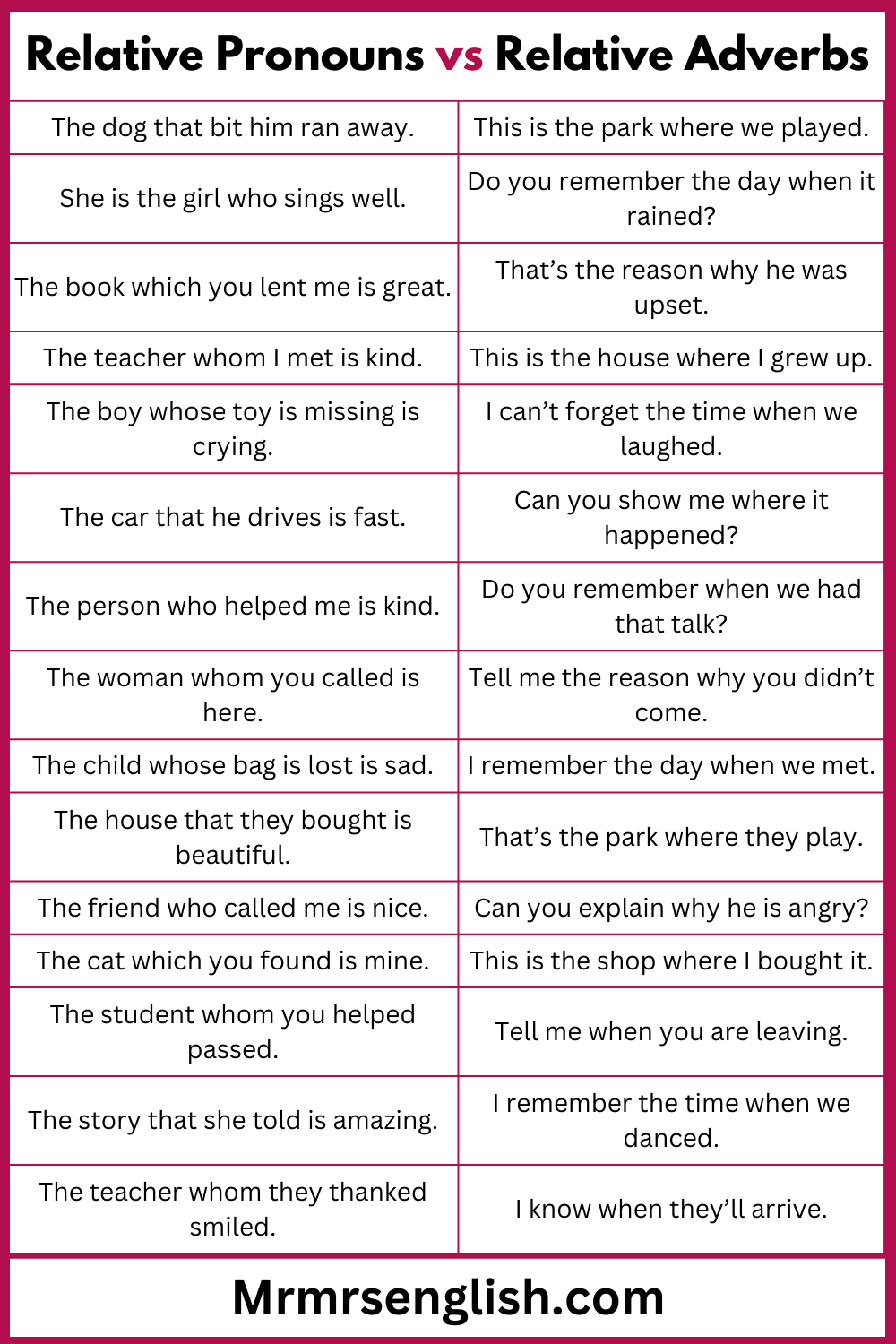
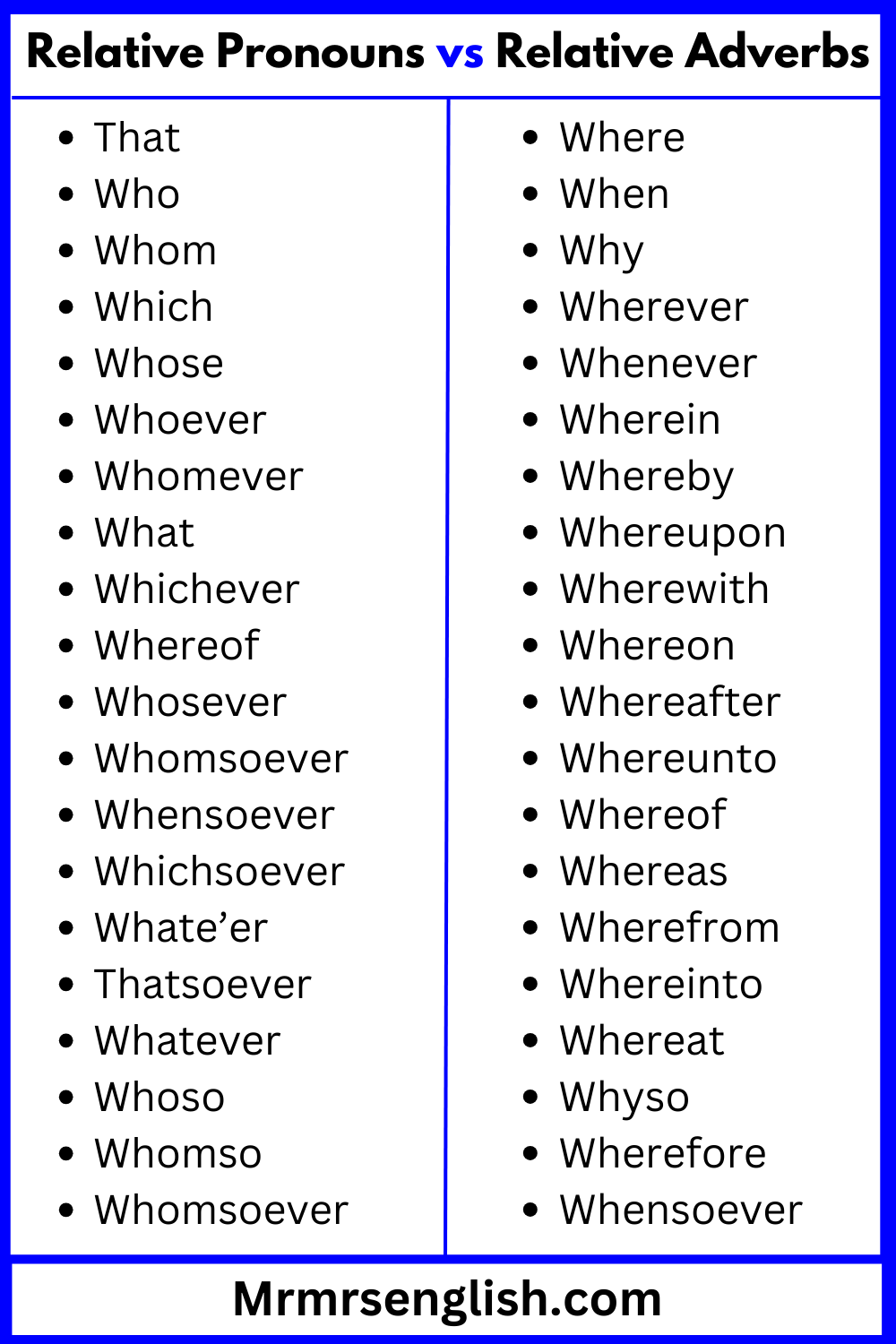

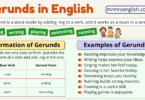
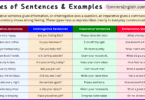
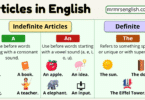
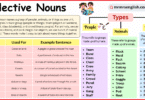
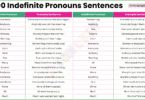
Leave a Comment